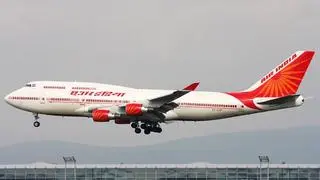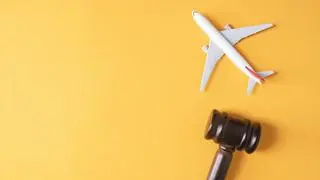There are millions out there who would rather find their way through a minefield than step into an aircraft — they have an irrational and intense fear of flying. Statistics show that flying is safer than most other popular modes of transportation, but try telling that to an aviophobe.
Such unreasonable fears are also not good for the aviation industry. Little wonder then that a host of international airlines are spending big money to help those with a fear of flying tackle it. British Airways, Virgin Atlantic, Swiss, Israeli airline El Al and Air France are among a handful of airlines offering both ground courses and special flights to tackle the fear.
Typically, the courses have classroom sessions where the nitty-gritty of an aircraft and how it flies are explained by a team of pilots and cabin crew. Some airlines provide time in a simulator, while others make spending time in a real flight a part of the course. Almost all the courses have psychologists as part of the team.
But what exactly is this fear of flying?
The El Al website says that the fear of flying is common, and is experienced by one in six people. The fear manifests itself as physical and psychological distress. This is a very real fear for those who suffer from it and ignoring it or not giving validity to its existence can actually make it worse. It’s very common among Indians too. “We have people from all parts of the world, races and creeds,” says Richard Conway, who along with Paul Tizzard set up the Virgin Atlantic ‘Flying Without Fear’ programme 18 years ago and still runs it. “You will find several Indians in most of our courses.” A mail sent to several Indian airline operators on whether they have similar courses remained unanswered.
A natural feelingEl Al reminds passengers that fear is a natural feeling and arises automatically when we sense danger. If we relate to flying as a danger, it is natural for anxiety to arise. And as there actually is no danger or very slight danger, the feeling of fear during a flight is actually a “false alarm”.
Moran Birger, Regional Commercial Manager, British Airways, told BusinessLine that his was the first airline to offer customers help through its ‘Flying with Confidence’ course led by Steve Allright, a BA Captain for the past 24 years. “The aim of the training course is to provide professional counselling for people who have a fear of flying,” he explains. Of course, there are many simple suggestions that one can use like breathing exercises: counting from one to three as you inhale (progressing on the first number, but keeping the second and third constant — 1-2-3, 2-2-3, 3-2-3, etc.), and saying “Reeelaax” when exhaling.
But clearly scared flyers need more than just simple exercises and this is where international airlines are stepping in. For instance, a part of the Air France course is conducted on a flight simulator at its pilot training centre at the Paris-Charles de Gaulle airport. Those who take up the course get a chance to take control of the aircraft with the pilot, and experience all flight conditions (turbulence, emergency procedures, and so on). Taking this a step further is Virgin whose website states that during the course the pilot narrates every movement and noise throughout the flight. You can then decide whether you believe what the professional pilot is telling you or the bizarre feelings in your stomach and ears.
There’s moreA typical two-day Swiss programme includes a session in psychology where issues like triggers and symptoms of fear, a closer look at fear as a phenomenon, and breathing and relaxation exercises are discussed.
There is a session on technology, which includes explanations by a pilot and a flight attendant, a closer look at flying and flight safety, and visiting an aircraft on the ground. There is also the all-important question and answer session. The next day the participants go through mental exercises, pre-flight discussions and relaxation exercises after which comes a flight to a destination in Europe, a short stay at the airport and return.
These courses seem to be catching the fancy of fliers — Conway says over 50,000 people have attended the Virgin course in the 18 yearssince it started, while over 45,000 have been helped by the BA course, according to Birger.
The courses naturally come at a price. The Virgin ground course costs 150 pounds while the BA course at London Heathrow costs 309 pounds. This also includes a 45-minute flight on a BA jet aircraft. Similarly, the Swiss course costs 1,200 Swiss francs and also includes a flight.
The measure of successAirlines have their own ways of finding out how successful the courses are. Virgin measures the success in two ways. The airline does a simple count of how many take a flight (after attending the course). But that doesn’t show how many of those would have flown regardless of the course.
“On random courses, we ask people to rate at the beginning and end how they feel about flying on a scale of 1-10. On the random course we have chosen to evaluate, this is asked of all the people who attend regardless of whether they have flown before, currently fly or have never flown. We then use that difference to give us a measure of how the course has improved their feelings towards flying,” the Virgin website says.
Adds Conway: “It is not just about people getting on to a flight at the end of the day. More often than not 100 per cent of the people get on to a flight. What I want to know is that it does not just stop there. We ask for feedback on the courses. We also get a lot of feedback from people post course,” he says.
And then there is the final endorsement. According to Hollywood star Whoopi Goldberg, the course works. “The programme works. I now fly. It’s that simple,” she says on the Virgin site.







Comments
Comments have to be in English, and in full sentences. They cannot be abusive or personal. Please abide by our community guidelines for posting your comments.
We have migrated to a new commenting platform. If you are already a registered user of TheHindu Businessline and logged in, you may continue to engage with our articles. If you do not have an account please register and login to post comments. Users can access their older comments by logging into their accounts on Vuukle.